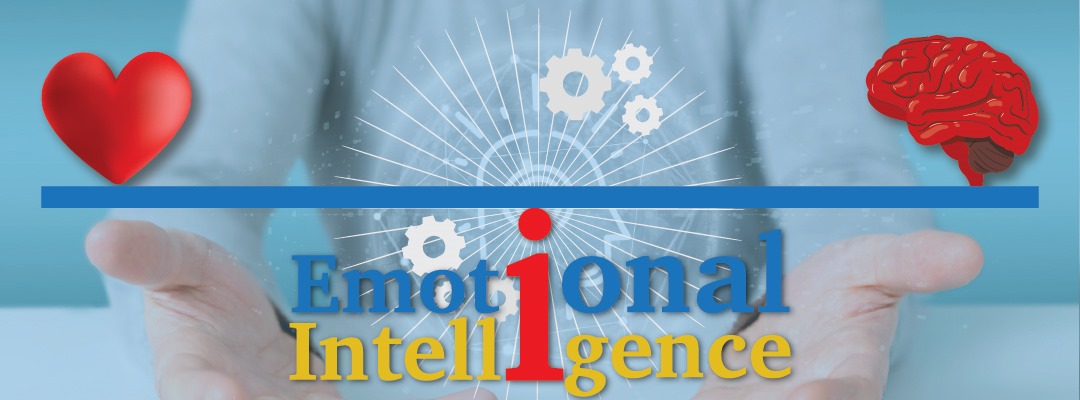The rise of hybrid work models has redefined the landscape of leadership. While offering flexibility and convenience, managing a team scattered across physical and virtual…

The rise of hybrid work models has redefined the landscape of leadership. While offering flexibility and convenience, managing a team scattered across physical and virtual spaces presents unique challenges. Building trust, fostering collaboration, and maintaining motivation require a special set of skills: those encompassed by Emotional Intelligence (also known as Emotional Quotient -EQ).
EQ goes beyond intellectual intelligence, focusing on understanding and managing our own emotions while recognizing and responding to the emotions of others. It’s a crucial component of effective leadership in any environment, and even more critical in the complexities of a hybrid one.
Emotional Intelligence or EQ as is more commonly referred, encompasses five core skills:
• Self-awareness: Recognising your emotions and how they influence your thoughts and actions.
• Self-regulation: Managing your emotions effectively and adapting them to different situations.
• Empathy: Recognising and understanding the emotions of others and responding with compassion.
• Motivation: Maintaining a positive and inspiring attitude, motivating yourself and others.
• Social skills: Building strong relationships, communicating effectively, and resolving conflicts constructively.
These skills are not innate and can be learned and developed over time through conscious effort and practice.
In a hybrid environment, clear communication is paramount. With team members dispersed across locations, strong empathy and active listening become essential to understand their perspectives and concerns truly. Managing emotional responses to situations becomes crucial. For instance, a leader’s ability to regulate their frustration. Over a delayed response from a team member remote team member can be addressed with self-regulation and clear communication, rather than resorting to blame or criticism. Such emotional regulation not only enhances collaboration but also prevents potential conflicts, underlining the essence of Emotional Intelligence in fostering a cohesive team environment.
Cultivating Emotional Intelligence is an ongoing process. Leaders can adopt several strategies to improve this, including:
• Engage in Self-reflection: Regularly assess your own emotions and their impact on your leadership style.
• Practice Actively Listening: Pay close attention to verbal and nonverbal cues when communicating with team members, both in person and virtually.
• Foster open communication: Create an environment where team members feel comfortable expressing themselves, and offer frequent feedback opportunities.
• Recognise and appreciate contributions: Acknowledge and celebrate achievements of your team members, regardless of their location.
• Leverage technology effectively: Utilize video conferencing and other tools to foster face-to-face interaction and build stronger bonds.
I have personally found that working with an EQ coach has been invaluable in developing these skills and creating a more positive and productive work environment for my hybrid team. This was key to my success as a Leader during the pandemic.
In the evolving landscape of hybrid work, the journey of enhancing Emotional Intelligence is pivotal for leadership success. Daniel Goleman, a pioneer in EI research, stated, “Emotional intelligence is not a luxury you can dispense with in tough times. It is a basic tool that, deployed with finesse, is the key to professional success.” By actively practising the strategies mentioned above and seeking guidance from an EQ coach you can navigate the complexities of hybrid leadership and build a thriving, resilient and well-connected team.
Do you have any thoughts or experiences about how EQ has impacted your leadership in a hybrid environment? Share your insights and consider connecting with Reframing Visions to learn more about how to develop your emotional intelligence and become a more effective leader in today’s work landscape.
Mus mauris vitae ultricies leo. A condimentum vitae sapien.
The rise of hybrid work models has redefined the landscape of leadership. While offering flexibility and convenience, managing a team scattered across physical and virtual…
In the journey of self-development, there comes a time when we encounter the formidable obstacle known as feeling stuck. It's a universal experience, yet its…
Navigating Career Transitions: The Role of Coaching in Times of Change Giridhar 2024/02/19 Career Transitions In the fast-paced corporate landscape, career transitions have become an…

Subscribe to our newsletter and stay updated on our knowledge resources as we post
© 2023 All rights reserved